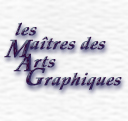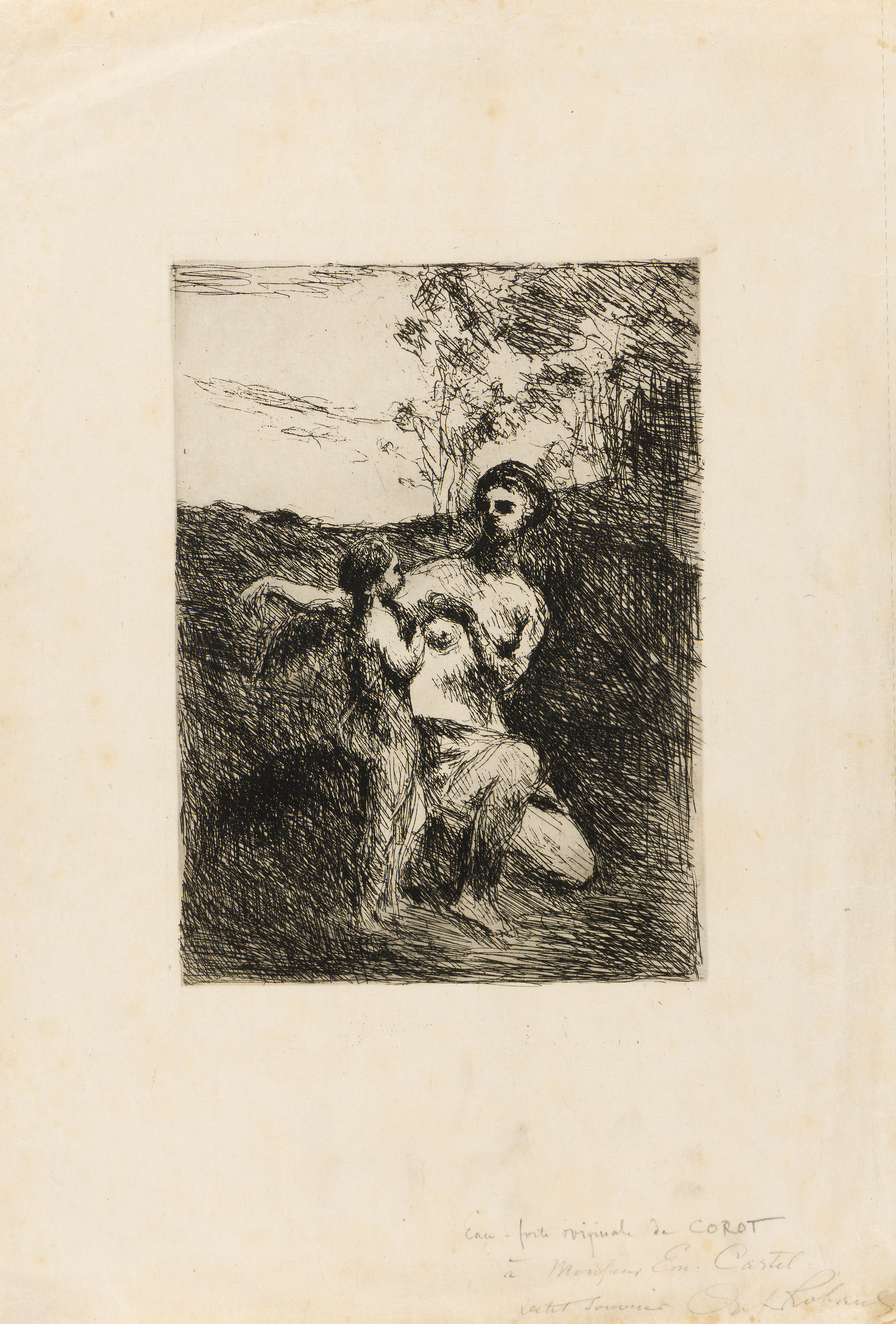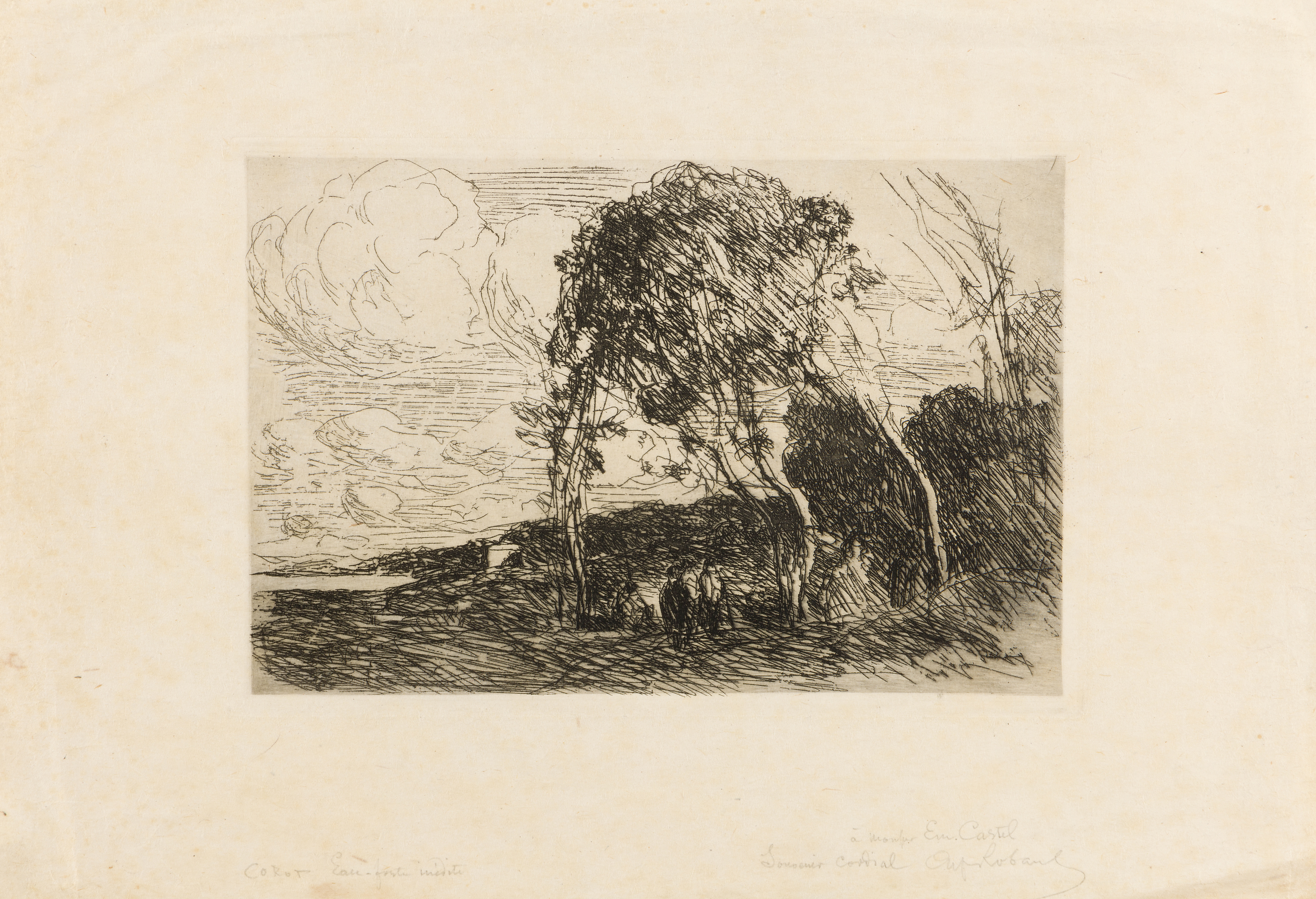
|
P. 240x160mm, S. 395x267mm.
|
Vénus coupant
les Ailes de l'Amour / 1re planche
Robaut 3132,
Delteil 10, Melot 10
etching, circa 1869-70,
on medium-fine cream fibrous Japon
ancien* paper with wirelines,
the first (and only) state, a fine impression with wide
margins, one of the rare lifetime proofs printed by Alfred Robaut,
printed with plate tone, selectively darkening the foreground, the
plate edges wiped clean, signed and
dedicated in pencil, lower right, "Eau-forte originale de Corot / à
Monsieur Em. Castel / par tel souvenir Alf Robaut"
by Alfred
Robaut, numerous handling creases and crinkling in the outer
margins, some spotty time staining/foxmarks in the margins,
mostly at the edges (see close-up of the dedication, below, right), otherwise in very good condition, never having been framed or mounted


(Cf. the impression listed by Sarah Sauvin, on a smaller sheet of laid paper: https://www.sarah-sauvin.com/index.php?option=com_virtuemart&view=productdetails&virtuemart_product_id=277&virtuemart_category_id=211&lang=fr)
|
Provenance: a private
French collection
P. 160x240mm., S. 259x387mm.
|
Souvenir
des
Fortifications de Douai
Robaut 3134,
Delteil 12, Melot 12
etching, circa 1869-70,
on medium-fine cream fibrous Japon ancien* paper with wirelines,
the 1st (and only) state, a fine impression with wide margins,
one of the very rare lifetime proofs printed by Alfred Robaut, printed
with selective plate tone, the plate edges wiped
clean, signed and dedicated in pencil "Corot Eau-forte
inédite" and farther to the right, "à Monsieur Em. Castel/
Souvenir cordial Alfrred Robaut" by Alfred Robaut; numerous
handling creases and
crinkling in the outer margins, slight time staining/foxmarks in
the margins, stonger at the edges (see close-up of the dedication, below), otherwise in very good condition, never having been framed or mounted
 

|
Provenance: a private
French collection
These fine etchings,
among Corot's last, are also to be counted among his most important
(cf. Roger Passeron 1974**, who, noting the extreme freedom of
line, considers Le Dôme Florentin to be a masterpiece).
They were furthermore never published during the artist's lifetime,
and thus such early proofs are most exceptional, the result of
a rather curious history.
According to Alfred Robaut,
these two plates (along with one other) were put aside by Corot
after having completed the drawing in the varnish ground, yet
before having them etched, and were subsequently mislaid for several
years.
They were rediscovered in the winter of 1872 by the artist, and
given to Robaut, who relates (his unpublished notes, in Delteil, at his
entry to Vénus coupant les Ailes de
l'Amour, Delteil 10):
Le
6 juin
73 je fais faire chez Salmon l'essai de cette planche et des deux
qui suivent. J'en fais tirer de chaque 2 épreuves sur papier
à la forme - de hollande - et 5 épreuves sur chine
volant. C'est M. Delaunay Alf. qui a fait mordre les planches...
C'est
l'hiver dernier que le Maître les avait retrouvées, et qu'il me les a
offertes n'en ayant aucun parti à tirer lui-même... Le 14 novembre 73 j'en ai fait
tirer chez Cadart 2 épreuves
de chaque sur japon."
["On 6 June 73, I went to
Salmon's shop to run trials of this plate and the two that follow [i.e.
Delteil 12 and 13]. I had him print two impressions on laid paper -
from Holland - and five impressions on Chine volant. It was Mr Alf.
Delaunay who etched the plates... On 14 November 73, at Cadart's shop,
I had two impressions of each plate pulled on Japon."]
In his catalogue raisonné,
the first such work devoted to Corot, Robaut further gives these
prints a "RRR" rating, i.e. extremely rare, specifying
"quelques épreuves d'essai seulement."
Delteil however records some twenty proofs pulled between 1873
and 1890, supposing a certain number of later impressions between
Corot's death and the sale of the plate in 1908.
* This paper is identical
to that of one of the two early proofs of the Dôme Florentin
now in the Bibliothèque Nationale de
France (from the Moreau-Nelaton
collection, and, formerly, that of Alfred Robaut). Sometimes mistakenly
identified as "Chine volant" (cf. the 1991 BN catalogue
of the Moreau-Nelaton donation, and that of the 1931 Corot exhibition)
because of its fineness, whitish colour, and matte aspect, it
contrasts with the heavier weight, the cream-yellow colour, and
the satiny aspect of the Japon paper of the other proof.
Thus there are two varieties
of Japon in the early proofs, and although Cadart may have used
such different papers, the two BN impressions are not printed
in the same manner, the first being sharper and more contrasted,
the second more heavily inked.
Furthermore, there are
known early impressions of these prints on Chine volant properly
speaking: the sole proof in the BN of the first plate of this
series (Delteil 11, also from the Robaut collection), and the
impressions of Delteil 12 and Delteil 13 from the Samuel Avery
collection in the NYPL. It is thus specifically
difficult to identify the Cadart impressions. Whatever conclusions
may be drawn, it remains that these impressions were considered
to be choice proofs by Robaut himself, as witnessed by their presence
in his own collection and his moving dedication. We have not
however been able to identify the dedicatee.
** Roger Passeron, La
Gravure Impressionniste 1974; see also the RMN/BN exhibition
catalogue De Corot aux Impressionistes, donations Moreau-Nélaton,
1991, and the BN exhibition catalogue Corot, le Génie
du Trait, 1996.






